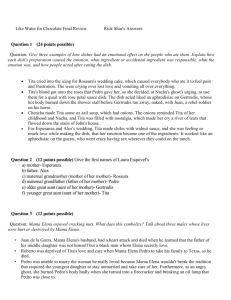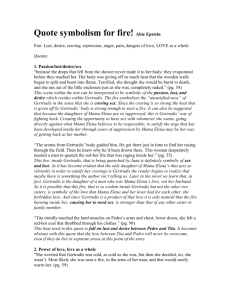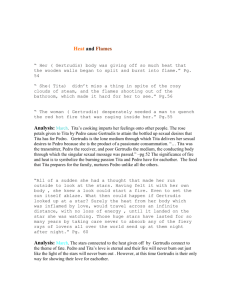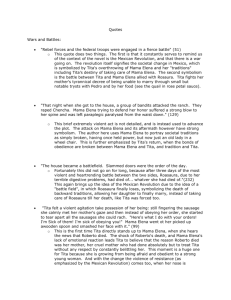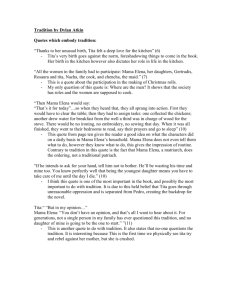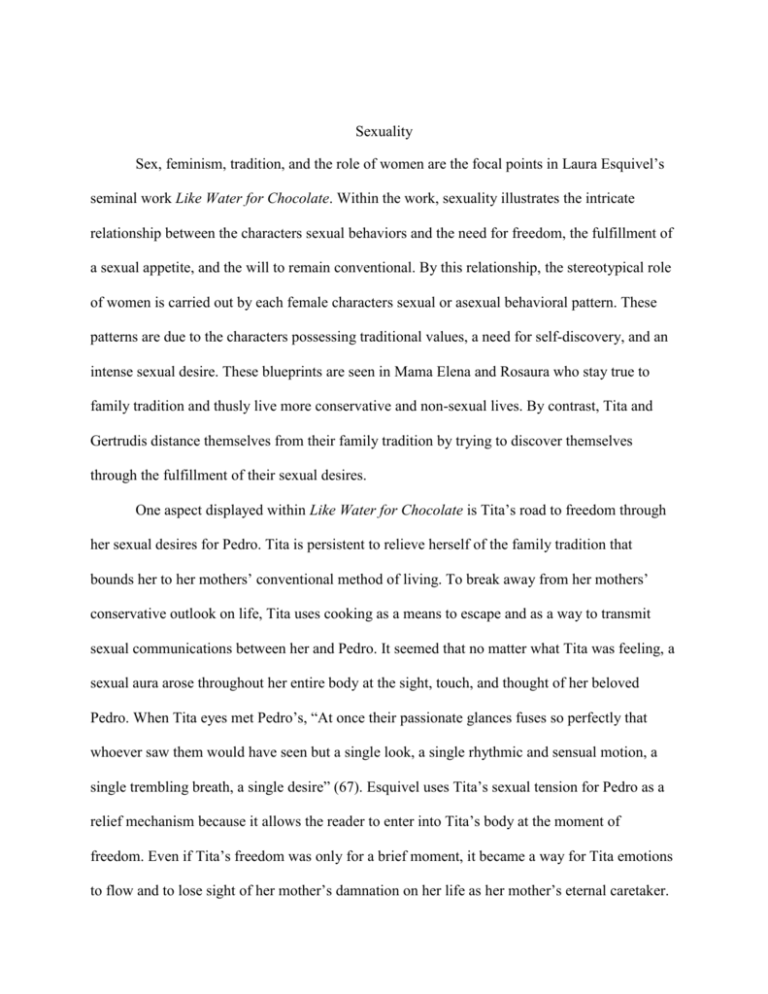
Sexuality
Sex, feminism, tradition, and the role of women are the focal points in Laura Esquivel’s
seminal work Like Water for Chocolate. Within the work, sexuality illustrates the intricate
relationship between the characters sexual behaviors and the need for freedom, the fulfillment of
a sexual appetite, and the will to remain conventional. By this relationship, the stereotypical role
of women is carried out by each female characters sexual or asexual behavioral pattern. These
patterns are due to the characters possessing traditional values, a need for self-discovery, and an
intense sexual desire. These blueprints are seen in Mama Elena and Rosaura who stay true to
family tradition and thusly live more conservative and non-sexual lives. By contrast, Tita and
Gertrudis distance themselves from their family tradition by trying to discover themselves
through the fulfillment of their sexual desires.
One aspect displayed within Like Water for Chocolate is Tita’s road to freedom through
her sexual desires for Pedro. Tita is persistent to relieve herself of the family tradition that
bounds her to her mothers’ conventional method of living. To break away from her mothers’
conservative outlook on life, Tita uses cooking as a means to escape and as a way to transmit
sexual communications between her and Pedro. It seemed that no matter what Tita was feeling, a
sexual aura arose throughout her entire body at the sight, touch, and thought of her beloved
Pedro. When Tita eyes met Pedro’s, “At once their passionate glances fuses so perfectly that
whoever saw them would have seen but a single look, a single rhythmic and sensual motion, a
single trembling breath, a single desire” (67). Esquivel uses Tita’s sexual tension for Pedro as a
relief mechanism because it allows the reader to enter into Tita’s body at the moment of
freedom. Even if Tita’s freedom was only for a brief moment, it became a way for Tita emotions
to flow and to lose sight of her mother’s damnation on her life as her mother’s eternal caretaker.
EATON 2
On the same note, Esquivel uses self-discovery as a major focal point in Gertrudis sudden
desire to fulfill her sexual needs. The start of Gertrudis new found revelation began when Tita
prepared quail in rose petal sauce where an intense sexual desire arose. When Gertrudis ate the
dinner, she became “the conducting body through which the singular sexual message was
passed” (52). Afterwards, Gertrudis began conducting her life according to her sexual impulses.
Her life consisted of working in a brothel. The brothel became the solution to conquer her sexual
spirit. In a letter written to Tita, Gertrudis explains that “I ended up here because I felt an intense
fire inside…Now at last, after so many men have been with me, I feel a great relief” (126). In
Gertrudis’s case, sexuality is understood as the path to individuality. The only desirable outcome
for Gertrudis was to have sex with as many men as possible in order for her to get rid of that
“itch at the center of her body” (51). To Gertrudis, there was no other way to self-discovery.
After her many rendezvous, Gertrudis finally found her calling as general of the Mexican
revolution.
On the other hand, Esquivel’s portrayal of Mama Elena’s and Rosaura as asexual is due
to their obedience to tradition. Tradition is defined as “a long-established action or pattern of
behavior in a community or group that has been handed down from generation to generation”
(Microsoft Office). Consistent with tradition, Mama Elena and Rosaura are structured, obedient,
and conventional. The absent of sex is due in part to Mama Elena and Rosaura conservative
outlook on life where sex is guarded. For Mama Elena, the absence of a male companion affects
her behavior towards sexuality because she takes on the dual role of matriarch and patriarch. Her
sexual tension is released in the form of bitterness, spitefulness, and resentment that she directs
towards her youngest daughter Tita. In return, Tita is destined to abstain from her mother’s
ruling by stating to her “Here’s what I do with you orders! I’m sick of them! I’m sick of obeying
EATON 3
you!” (99). As for Rosaura, she is the underling to her mother’s tyrant rule over the household.
Despite her mother not having a male companion, Rosaura is married. The reader only gets a
glimpse of the sexual encounters between Rosaura and Pedro. Esquivel uses Rosaura love life as
an example of sex being a guarded moment between husband and wife. In contrast, Esquivel
exemplified Tita and Gertrudis sexual encounters as elaborate movies.
The factors indicated above contribute to the complication that arises when establishing
the role of women in this novel. Therefore, the characters will be examined individually. In
addition, I would like to implicate that Laura Esquivel intention is to dissuade the reader from
the view of the stereotypical role of women. Esquivel’s heroine in the novel, Tita, is a young
woman who takes diligent care of the household. Esquivel portrays Tita as the obedient daughter
who is reluctant to escape her mother’s tight grasp on her life. If the stereotypes are taken into
consideration, Tita is a representation of the near perfect daughter because she does as she is
told. Tita cooks, cleans, and obeys the rule of the household. However, the reader knows the Tita
truly suffering from the traditional values that possess her household. Tita is forced to be the
caretaker; therefore, she rebels by using her sexual desires to fulfill her dreams of marrying
Pedro. On the other hand, Rosaura takes on the role as the perfect daughter who is obedient to
the traditional ways of her ancestors. Rosaura does not step out of place while in the presence of
her mother or anyone for that matter. Rosaura’s conventional methods is portrayed in her will to
keep Pedro’s and Tita’s adultery a secret. Rosaura tells Tita “I couldn’t care less if you and Pedro
go to hell for sneaking around kissing in every corner. From now on, you can do it all you want.
As long as nobody finds out about it” (214). Differently, Gertrudis is the wild child of the
children. She is perfect contradiction to the stereotypical role of women. She is promiscuous and
strong willed. Gertrudis sexual intensity leads Gertrudis on the road of self-discovery even
EATON 4
though she uses sex as a path to her revelation. Lastly, another contradiction from the
stereotypical role of women is Mama Elena’s despot behavior. Instead of acting as the nurturer
and caregiver, Mama Elena is seen as a dictator. She uses her tyrannical ways to dictate the
household where she instills fear and resentment upon her youngest daughter Tita. She possesses
more masculine qualities than feminine. For instance, when the revolutionaries came to raid her
home, “they were met by Mama Elena at the entrance of the house. She had her shotgun hidden
in her petticoat, and she had Rosalio and Guadalupe at her side. Her gaze met that of the captain
in charge, and he knew immediately from the steeliness of her eyes that they were in the
presence of a woman to be reckoned with” (89).
In all, sexuality is defined as the “state of being sexual, involvement or interest in sexual
activity, sexual appeal or potency.” However, In Like Water for Chocolate, sexuality is a theme
that is unique because the characters express their emotions differently often through asexual and
sexual characteristics. Sexuality becomes a middle connection between sexual impulses and the
desire to want. Whether that want be freedom, self-realization, or conservation, sexuality is seen
as the relief mechanism for the characters. This is evident through the willingness of particular
characters such, as Tita’s and Gertrudis’s will to find their individuality. For instance, Tita
sexuality arouse no matter what situation occurred because she wanted to be free to do as she
pleased and to marry Pedro, therefore her tension came off as sexual. Even though sex became a
major part as to why Tita and Pedro united, it was also the death of them. Gertrudis lived a sexoriented life so that she could find herself. Ultimately, Gertrudis became a revolutionary leader.
In opposition to Mama Elena and Rosaura who tended to hide their sexual behavior due to
reasons that are caused by traditional factors. Overall, sexuality is a complex characteristic that
EATON 5
not only affects and enhances the stereotypical role of women in society, but sexuality is shown
as a way to express emotions and individuality.



